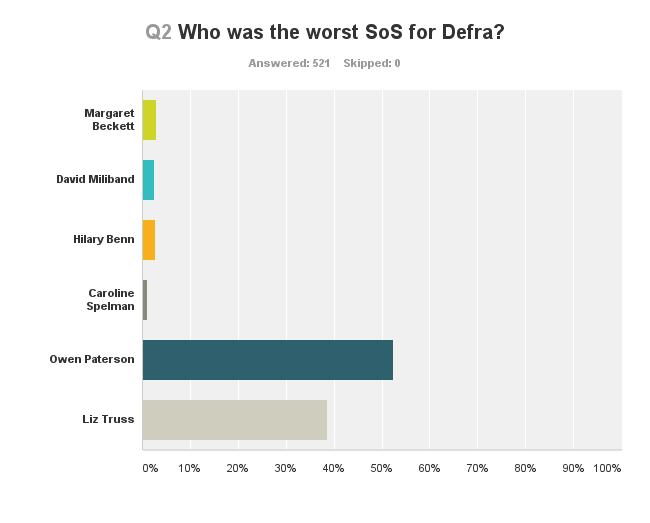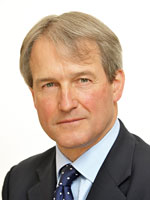There have been six secretaries of state at Defra since it came into existence in the wake of the foot and mouth disease outbreak in 2001. Defra was born out of the thought that MAFF was too inward-looking and that farming wasn’t that important really but was a bit of a problem. Prime Ministers also like to tinker with the structure of government now and again.
 We were expecting that the new department would be called DORA – Department of Rural Affairs – there were even rumours that the logo had been produced already but, on the day, again the rumours had it, the person offered the post, Margaret Beckett, negotiated for a larger department than was originally envisaged and the name changed. Maybe Mrs Beckett didn’t want to be Margaret of DORA.
We were expecting that the new department would be called DORA – Department of Rural Affairs – there were even rumours that the logo had been produced already but, on the day, again the rumours had it, the person offered the post, Margaret Beckett, negotiated for a larger department than was originally envisaged and the name changed. Maybe Mrs Beckett didn’t want to be Margaret of DORA.
Defra encompassed all of MAFF and some of the Department for Environment, Transport and the Regions (DETR – a mega-department under Deputy Prime minister John Prescott). Climate change was one of the areas added to the MAFF portfolio. From a nature conservation point of view, the fate of wildlife in the countryside was now firmly attached to the department which dealt with the fate of farmers in the countryside.
Margaret Beckett was Secretary of State from 2001-2006. Climate change, GM crops and farming dominated her lengthy tenure.
In May 2006 David Miliband became Defra Secretary of State and held the position for just over a year until being promoted to Foreign Secretary when Gordon Brown became PM. Miliband changed the emphasis of the department dramatically towards climate change as soon as he arrived in post. During this period the thinking about a Climate Change Bill gathered momentum resulting in a Climate Change Act in 2008 and the creation of the Department for Energy and Climate Change. Bird flu was supposed to kill us all but it didn’t.
From 2007 until the 2010 general election Hilary Benn was at the helm at Defra. Farmers moaned about having a vegetarian Secretary of State. The Marine and Coastal Access Act was passed but badger killing (or not) dominated the agenda. The NFU persuaded Defra not to introduce mitigatory measures to compensate wildlife for the loss of the benefits of set-aside.
Then there was a general election and Caroline Spelman, surprisingly, became Defra Secretary – possibly because previous plans were disrupted by having to fit in a few Lib Dems (whatever happened to them?) into the Tory government. There was a forestry debacle where Spelman was treated badly by David Cameron but she left a lasting legacy in her personal, and the UK’s, impact on the Aichi targets which, in theory, all governments are now working towards. Badgers were pretty nervous about their future.
Owen Paterson was the strangest choice for Defra ever: climate change sceptic, anti-EU but he did once have a pet badger. Ash dieback was hardly his fault but badger culls were moved forward with enthusiasm.
In the era of ‘green crap’ it didn’t really matter who was pretending to be in charge at Defra and so we got Elizabeth Truss.
But how did the 521 of you see these six paragons and leaders of the environmental movement?
There was a clear winner in each category: more than half of you saw Hilary Benn as the best Defra Secretary of State (52%; David Miliband, 17%; Margaret Beckett, 14%; Caroline Spelman, 10%; Owen Paterson, 5% and Liz Truss nowhere with 2%).
 And who was the worst? Again, a very clear ‘winner’ with more than half of the vote: Owen Paterson (52%; Liz Truss, 39%; Margaret Beckett, 3%; Hilary Benn, 3%;, David Miliband, 2%: Caroline Spelman, 1%).
And who was the worst? Again, a very clear ‘winner’ with more than half of the vote: Owen Paterson (52%; Liz Truss, 39%; Margaret Beckett, 3%; Hilary Benn, 3%;, David Miliband, 2%: Caroline Spelman, 1%).
 I voted for Hilary Benn in the first category and for Liz Truss in the second.
I voted for Hilary Benn in the first category and for Liz Truss in the second.
If I had to rank the six of them by how much I felt in tune with their policies (not the question asked, I know) then I might well rank them Benn, Spelman, Beckett, Miliband, Paterson and Truss at the bottom. Given that this audience is noticeably left of centre in its views, I am very glad to see that Caroline Spelman was the ‘least worst’ of all six and was far and away the most ‘popular’ of the three Conservatives – she did her best and was a good person who achieved things.
And if I had to rank the six of them by their effectiveness in getting their way, then I’d probably rank them Miliband, Paterson, Beckett, Benn, Spelman and Truss. David Miliband achieved a lot of what he wanted, kicking off climate change action, in his very short stay in Defra. And no-one can accuse Paterson of hanging around consulting everyone while he was in post – he went for what he (wrongly in my opinion) felt was right.
Liz Truss should realise how low she is taking the reputation of the natural environment in the eyes of those who care about it. Could do better? I doubt it.
Thanks for participating in this entirely trivial poll – it was fun for me to see the results roll in (but as always they were pretty clear after c20 votes – the next 500 confirmed those early impressions!).
[registration_form]

![By Steve Punter from London, UK (Current chairman of the Tory Party) [CC-BY-SA-2.0 (http://creativecommons.org/licenses/by-sa/2.0)], via Wikimedia Commons](https://markavery.info/wp-content/uploads/2012/11/800px-Caroline_Spelman-150x150.jpg)



My vote was the same as yours Mark, but reading your summary maybe Beckett was better than I remember. I had completely forgotten her tenure was so long and I struggle to remember anything that really fanned the flames from that period. That alone makes me think she may have been more effective than I gave her credit. I also agree on Spelman, who was showing signs of being reasonably balanced in her approach. Maybe that’s why she was dumped.
“why she was dumped”
She wore red shoes
no, she was dumped for trying to sell off the Forestry Commission – and someone had to take the wrap for it.
http://www.fwi.co.uk/business/bps-delays-down-to-childish-turf-war-between-civil-servants.htm?cmpid=NLC|FWFW|FWNEW-2016-0304
Wouldn’t it be lovely to have a separate Department of the Environment with a Secretary of State vigorously fighting for the interests of wildlife?
Or indeed a collaborative conservation lobby fighting effectively for the interests of the natural environment and the public benefit, regardless of Defra and the Secretary of State – however tiny the Natural Englang budget might be.
Spelman also managed to secure an evidence based outcome to the Review of the Implementation of the Birds and Habitats Directives in England (they work and they do not place unnecessary burdens on business) , in the face of an attack by the anything but evidence-based George Osborn….
ktj – indeed she did!
One notes that Defra is now pulling out all the stops to ensure that Owen remains the as the Department’s defining nadir, for today, DefraNature announced 5 ways to help a hedgehog.
Could that be a Nature and well-being Bill? A continuation on the ban on glyphosphate? A vaguely effective enviromental watchdog? An effective evidence led and appropriately funded approach to ecosystem services at the heart of sustainable development? Or something that has the rank whiff of Giving Nature a Home about it.
Yes, Defra has teamed up with some conservation organisations to bring you 5 handy hints about how you can help our prickly insectivorous friends with La Truss waxing lyrical about hedgehogs in her childhood garden home.
Of course it’s good that, however obvious the handy hints are and however often they’ve been highlighted by hedgehog experts, the Wildlife Trusts, the RSPB, Uncle Tom Cobbley et al that they get to be further reinforced. But why is there a need for DefraNature, given the existence of Natural England (who previously pinched those clothes from the Wildlife Trusts), and what is its audience. And why (oh why) have the announcements been accompanied by pictures of a cute little hoglet that’s definitely been imported from overseas or a a true blue British hedgehog that’s on some tarmaced or other hard-sufaced area, dvoid or herbage or, errm, anything very much.
To quote
“Speaking today, the Environment Secretary lent her support to campaigns encouraging local communities to work together to look out for the hedgehog and make gardens as welcoming as possible. From letting grassy areas grow wild to providing food and shelter, she explained the simple steps we can all take to protect hedgehogs.
Environment Secretary Elizabeth Truss said:
Hedgehogs are one of our most treasured animals and play an important role in both this country’s heritage and natural environment.
Glimpsing hedgehogs in my garden is one of my fondest childhood memories and inspired me to learn more about the world around me.
I want to ensure children for generations to come can enjoy this special sight, but this can only happen if everyone does their bit to look out for these important creatures – that’s why we have developed these simple tips to help adults and children alike learn more about our precious wildlife and how we can all support it.
Defra has worked with the British Hedgehog Preservation Society and People’s Trust for Endangered Species to provide five easy ways everyone can help hedgehogs thrive in back gardens.
The five tips for creating a hedgehog haven in your garden are:
Let areas of garden grow wild to mimic hedgehogs’ natural habitat
Provide shelter in the colder months through logs piles and compost heaps
Use garden chemicals such as slug pellets carefully
Leave out water and foods such as boiled eggs, chopped nuts and sultanas
Consider planting hedgerows to help hedgehogs move between gardens
Fay Vass, Chief Executive of the British Hedgehog Preservation Society said:
We are delighted that the Environment Secretary, Elizabeth Truss is speaking out on how to help hedgehogs.
With their population falling by a third in urban areas and by half in rural areas since 2000, doing all we can to help Britain’s only spiny mammal is more important now than ever.
I hope these tips will inspire people to find out more and perhaps even become a Hedgehog Champion themselves at http://www.hedgehogstreet.org.
These tips come ahead of plans to provide one million native British trees to schools and local communities as part of a new Government campaign later this year to connect children with nature and the environment. They also support Defra’s 25 year environment plan which will be published later in the year as part of a comprehensive, long-term vision to protect and enhance the country’s natural environment. ”
Of course one of the other things that we’re encouraged to do is have ponds in our gardens which, especially if you have one those rigid plastic liners with no meansof escape, is a great way to drown hedgehogs. Hedgehogs can climb but leaving gaps in the fence [Note to self: Market fence panels with ‘hog’ flaps] or indeed to have a hedge
(the clue’s in the critter’s name) can be a good thing. Don’t waste money on hedgehog box. Have a ‘logs’ pile with an assortment of leafy litter that can be used as bedding. A well-made, active compost heap is still going to be generating heat. Mulch your flower beds with your well-rotted compost in order to encourage lots of things to thrive at the soil surface for ‘your’ visiting hogs to munch in the summer, especially when it’s dry.
Of course if you’re in a heavily urbanised area you’re probably better off having a garden pond. London is now a big hedgehog doughnut (not the jammy variety) with the hole in the middle getting bigger and bigger.
But if hedgehogs have declined so markedly, is it all down to Carol, Monty, and Alan telling us to manage our gardens in the wrong way. Or might there be other reasons which make the 5 ways of Liz something that won’t really be as useful as taking actions to reduce the negative impacts elsewhere.
Allotments are a bit like great big gardens aren’t they? If you’re not finding hedgehogs there anymore then local extinction seems likely.
So what’s next from Liz and DefraNature? 5 ways to help bumblebees without saying the N word? Advice on helping frogs? Advice on how to compost dead things removed from your garden pond? Or some other prickly topic? Something to do with moorland? Or the removal of unsightly hares? Perhaps even the proper aftercare of one million native trees of unknown provenance?
Actually, not so trivial. It is interesting – actually rather tragic – that radical ideas on landuse proposed by David Milliband during his short tenure were comprehensively buried (after Milliband had moved on) by the subsequent Foresight landuse project which included the major conservation bodies and no less than 40 Professors. Nearly 10 years ago now, Milliband’s ideas mirrored a lot of what has now appeared in the Natural Capital debate, which to me is a game changer but seems of limited interest to the conservation lobby.
It is also interesting that the conservation lobby – which was as badly caught out as the Government – continues to discount the forestry sales fiasco: it wasn’t in the plans of an increasingly conservative group of leaders, went against their hard won – and now disastrously discounted – position as political insiders and equally conflicted with past triumphs over forestry policy. Interestingly, the Conservatives have not made the same mistake, to the extent that the sales fiasco was name checked by George Osborne in the autumn statement in what comes as close to a joke as Osborne ever gets. Cameron did not act unfairly: a nerve had been touched, painfully, if briefly, deep in the heartlands of shire conservatism.
Roderick – Cameron did act unfairly and ungentlemany in cutting his SoS off at the knees at PMQs for following government policy! he could have made the same political shift in a much better way. He panics – it’s not good.